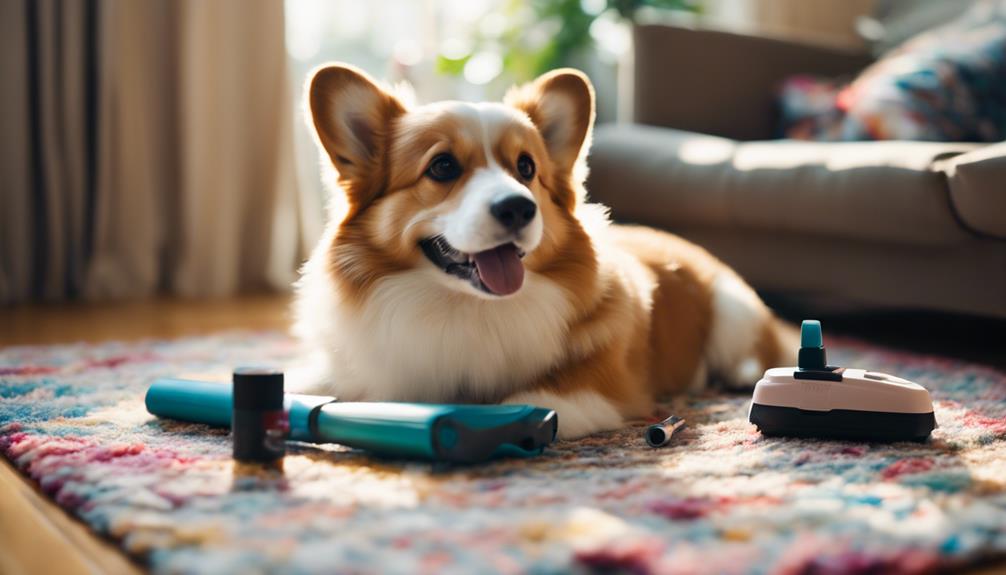Corgis are known for their charming personalities and distinctive coats, but their shedding can pose a challenge for many owners. Understanding the underlying causes of shedding and exploring effective management strategies is essential for maintaining a clean home and a healthy pet. From grooming techniques to dietary adjustments and environmental controls, each aspect plays a crucial role in minimizing fur loss. However, the effectiveness of these solutions can vary significantly based on individual circumstances, prompting a closer examination of the best practices tailored to your corgi's unique needs.
Understanding Corgi Shedding Patterns

Corgis exhibit distinct shedding patterns influenced by factors such as seasonal changes, health, and grooming practices.
There are two primary corgi coat types: the Pembroke Welsh Corgi, with a shorter coat, and the Cardigan Welsh Corgi, featuring a denser, longer coat.
Both types experience shedding frequency that varies throughout the year. Typically, corgis shed more during spring and fall as they transition between their winter and summer coats.
Healthy corgis may shed regularly, while those with health issues may show increased shedding.
Understanding these patterns is essential for pet owners, as it can help anticipate shedding periods and manage expectations regarding fur around the home.
Regular monitoring of a corgi's coat can also indicate overall health.
Effective Grooming Techniques
To effectively manage shedding and maintain a healthy coat, implementing a consistent grooming routine is essential for corgi owners. Regular brushing is crucial, with a recommended brushing frequency of at least twice a week. This helps remove loose fur and prevents matting, which can lead to skin issues.
Utilizing various grooming techniques can enhance the effectiveness of this routine. For instance, start with a slicker brush to detangle the coat, followed by a bristle brush to smooth the fur and distribute natural oils.
Additionally, a deshedding tool can be beneficial during peak shedding seasons. By adhering to these practices, corgi owners can promote a healthier coat while minimizing shedding, resulting in a happier pet and a cleaner home environment.
Recommended Tools and Products

Choosing the right grooming tools and products is vital for effectively managing shedding and maintaining the overall health of your corgi's coat.
Essential tools include shedding brushes, specifically designed to remove loose fur without damaging the undercoat. Look for brushes with stainless steel bristles for optimal results.
Additionally, vacuum cleaners equipped with pet hair attachments are crucial for keeping your home clean. These specialized vacuums can efficiently pick up fur from various surfaces, ensuring that your living environment remains fur-free.
Regular grooming sessions, combined with the right tools, can significantly reduce shedding and promote a healthier coat. Investing in quality shedding brushes and powerful vacuum cleaners will help you maintain a tidy home while keeping your corgi comfortable and well-groomed.
Dietary Considerations for Shedding
A well-balanced diet plays a crucial role in managing shedding, as proper nutrition supports the overall health of your corgi's skin and coat.
To ensure your corgi has a healthy diet, consider the following dietary considerations:
- High-quality protein: Look for dog foods rich in protein to promote a strong coat.
- Omega fatty acids: These essential nutrients help maintain skin moisture and reduce shedding.
- Nutritional supplements: Adding supplements can enhance coat health and minimize hair loss.
- Food allergies: Be mindful of potential food allergies, as they can lead to skin issues and increased shedding.
Environmental Factors to Manage

Environmental factors significantly impact a corgi's shedding patterns, making it essential to create a conducive living environment that supports coat health.
One important aspect is temperature control; maintaining a comfortable indoor temperature helps prevent excessive shedding. Extreme heat can lead to stress, prompting more fur loss.
Additionally, humidity levels play a critical role. A well-balanced humidity level (between 30% and 50%) helps keep a corgi's skin hydrated and its coat healthy. Low humidity may cause dryness, leading to increased shedding.
To manage these factors effectively, consider using air conditioning or heaters for temperature control and humidifiers or dehumidifiers to regulate humidity.

